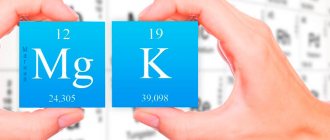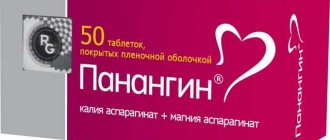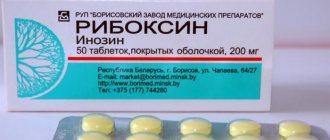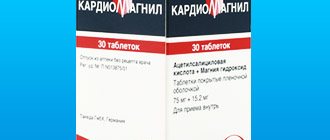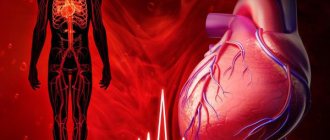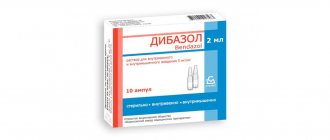Panangin Forte is a Hungarian drug produced by the Gedeon Richter company. The medicine is used to improve the metabolic processes of myocardial tissue, treat diseases such as arrhythmia, atherosclerosis, arterial hypertension, and as an auxiliary therapy for coronary heart disease, accompanied by attacks of angina and other symptoms. Panangin forte contains a higher concentration of active components in its composition, unlike classic Panangin, therefore it acts more efficiently and quickly.
Description of the drug and its composition
The product is produced in the form of oval tablets, their surface is slightly glossy, biconvex. The color is white or grayish-white, odorless. The medicine is available in blisters placed in cardboard packaging. One package of the product contains 60 capsules. Each tablet is engraved “A83”.
Like the classic remedy, Panangin Forte includes potassium, magnesium and auxiliary components. The tablet core consists of potassium (316 mg) and magnesium (280 mg). The capsule shell consists of macrogol-6000, butyl methacrylate copolymer, titanium dioxide.
Magnesium deficiency
Magnesium is also extremely important in metabolic processes. In addition, magnesium transports potassium across the plasma membrane. Therefore, it is impossible to eliminate potassium deficiency without compensating for magnesium deficiency. Combination preparations that contain potassium and magnesium are used precisely for this purpose.
Magnesium deficiency causes muscle spasms, tremors, and dizziness.
Causes of hypomagnesemia:
- Functional kidney failure.
- Diarrhea with pancreatitis.
- Diabetes mellitus, thyroid diseases, etc.
Potassium deficiency is manifested by tremor (muscle tremors), muscle spasms, nervousness, dizziness, and lack of coordination of movements.
Thus, potassium and magnesium are vital, and their deficiency can lead to serious illnesses.
Properties of Panangina forte
Thanks to the use of the medicine, it is possible to have a positive effect on the cardiovascular system and the entire body as a whole. Potassium and magnesium are valuable components that play a critical role in the formation of connections between intracellular structures and macromolecules in the mechanism of contractility of human muscle tissue. When the balance of potassium, sodium, magnesium and calcium ions in the body is disturbed, the functioning of the myocardium deteriorates, which leads to the development of hypertension, atherosclerosis, arrhythmias, cardiac conduction disorders and other heart failures.
Panangin Forte helps to establish metabolic processes, improves the contractile function of the heart muscle, and restores the tone of the nerve and muscle structures of the myocardium. In addition, the magnesium content in the preparation helps improve the enzyme reactions of the heart, which ensures normal contractility of the organ and reduces the heart's need for oxygen. Magnesium also prevents the development of coronary disease and is an excellent prevention of many complications in heart and vascular diseases.
Is it possible to drink to prevent heart problems?
In certain situations, there is an increased need for potassium and magnesium ions. Therefore, there are categories of people who are recommended to take preventive courses of taking Panangin after consultation with their doctor:
- After 45 years, as the risk of atherosclerosis increases.
- During intense sports activities due to increased load on the myocardium.
- If the work involves intense sweating (hot workshops, bakers), as well as those who like to frequent saunas and steam baths. Microelements are excreted through sweat.
- If you follow strict diets or take teas for weight loss.
- When using birth control pills.
- During treatment with hormones (under the control of blood electrolyte levels).
- Together with taking diuretics (except potassium-sparing) and cardiac glycosides, as well as some antihypertensive drugs (except ACE blockers).
- In case of intestinal dysfunction.
- During times of stress.
- To prevent weakening of the heart muscle after viral infections.
- For insomnia and convulsive syndrome due to deficiency, mania.
- In complex therapy of diabetes mellitus.
Indications for use
Taking Panangin forte is recommended for patients suffering from the following diseases:
- lack of potassium, magnesium, caused by vitamin deficiency and other conditions;
- coronary heart disease with manifestations of tachycardia and arrhythmia. For such patients, the medicine is prescribed as an auxiliary therapy in combination with treatment with other drugs;
- myocardial infarction in the acute stage to increase myocardial metabolism;
- myasthenia gravis, chronic form of heart failure;
- heart rhythm disturbances;
- arrhythmias provoked by the use of cardiac glycosides.
Panangin forte is used to treat heart disease
Self-administration of the medicine is unacceptable. The drug has a number of contraindications and is prescribed by a specialist based on the patient’s medical history and diagnosis.
Important! Patients who have previously taken Panangin should take into account when switching to Panangin Forte that the product contains an increased concentration of active ingredients.
Will the drug help with arrhythmia, including atrial fibrillation?
Panangin restores the disturbed balance of electrolytes in the tissues of the heart muscle, which leads to normalization of signals from the sinus node (the main source of rhythm) to the atria, and from them to the ventricles.
Myocardial cells become less susceptible to the influence of stress factors, the contraction rhythm slows down, and at the same time the volume of cardiac output increases.
This explains the effectiveness of Panangin in the prevention and treatment of arrhythmias that occur with an acceleration of the pulse rate:
- tachycardia;
- extrasystole;
- atrial and ventricular fibrillation.
Panangin is most effective for the treatment of atrial fibrillation of ventricular origin, including those associated with intoxication with cardiac glycosides. It is prescribed for the prevention of microelement imbalances in combination with the main antiarrhythmic drugs to strengthen the myocardium.
Contraindications
Instructions for use contain a description of diseases for which the use of the drug is prohibited. These include:
- personal intolerance to the active or auxiliary components of the drug;
- serious kidney pathologies, including chronic as well as acute failure;
- excess magnesium and potassium. The use of the drug can provoke hyperkalemia, hypermagnesemia;
- any diseases accompanied by dehydration;
- violation of amino acid metabolism;
- severe cases of myasthenia gravis;
- cardiogenic shock;
- heart block;
- the patient's age is under 18 years;
- Addison's disease;
- severe liver diseases.
Panangin Forte is prescribed to women during pregnancy with extreme caution, especially in the first 3 months of pregnancy. The decision to take medication during lactation is made solely by the attending physician if the expected benefit outweighs the risk of developing negative consequences.
Contraindications to taking the medicine
The drug is not recommended in the following cases:
- renal failure;
- drop in blood (systolic) pressure below 90 mmHg. Art.;
- decreased secretion of adrenal hormones;
- muscle weakness syndrome (myasthenia gravis);
- burn disease (with hyperkalemia);
- 3rd degree impulse conduction block;
- acute period of peptic ulcer and pancreatitis;
- with individual intolerance.
There are no sufficient studies on side effects in children, so most often Panangin is not prescribed for children under 12 years of age.
Difference from classic Panangin
Many patients are interested in what is the difference between Panangin and Panangin Forte? In Latin, the word forte means strong, strengthened, durable. It is included in the name of drugs that have an enhanced effect, including an increased concentration of active components.
If we conduct a comparative analysis of the composition of Panangin and Panangin Forte, it is clear that the second version of the medicine contains a larger number of active components.
Panangin contains:
- magnesium – 175 mg;
- potassium – 166 mg.
Panangin forte contains:
- magnesium – 350 mg;
- potassium – 332 mg.
In addition to the composition, the difference from Panangin fortified drug lies in the packaging. Regular Panangin is packaged in plastic tubes. Panangin forte is produced in capsules. There is also a noticeable difference in the price of these two drugs. Panangin Forte is more expensive.
Panangin and Panangin Forte have the same composition and action
It is impossible to unequivocally answer which is better, a classic or enhanced drug. The doctor should select the remedy, taking into account the characteristics of the disease and the client’s personal preferences.
Precautionary measures
You should not think that Panangin is harmless just because the medication belongs to the category of mineral supplements. The list of its side effects is quite impressive. If the rules of administration are violated, the likelihood of the following negative reactions increases:
- vertigo;
- headache;
- arterial hypotension;
- redness of the facial skin;
- heat;
- excessive sweating;
- nausea, vomiting;
- diarrhea;
- discomfort in the left hypochondrium;
- myasthenia gravis (muscle weakness);
- muscle spasms;
- dyspnea;
- itching
If the dosage and frequency of use are violated, Panangin provokes side effects
If such symptoms occur, pregnant women should stop taking the drug and consult a doctor.
Panangin, like any medicine, has a list of contraindications:
- Increased concentration of potassium or magnesium.
- Lack of fluid in the body.
- Functional kidney failure.
- Advanced form of myasthenia.
- Hemolysis (destruction of the membrane of red blood cells and the release of hemoglobin from them).
- Acute acid-base imbalance.
- Amino acid metabolism disorder.
- Chronic adrenal insufficiency.
- Cardiogenic shock.
- Violation of atrioventricular conduction.
According to the instructions, Panangin is not contraindicated during pregnancy, but the doctor must monitor the condition of the expectant mother and fetus during treatment. According to doctors, the drug is safe for children, the main thing is to take the medicine for medical reasons and follow the dosage. The old instructions indicate that Panangin is contraindicated during pregnancy. This is explained by the fact that at that time there was no information about the effect of the drug on the embryo.
It is not recommended to take the drug in the 1st trimester, since during this period the formation of the baby’s main organs occurs. But in some cases, for example, with severe toxicosis, when the body loses a lot of fluid (including potassium), this is necessary.
But the decision to prescribe medication is made by the doctor. This is necessary, because with severe dehydration, the potassium concentration increases, the blood becomes thick, and the additional supply of the microelement is dangerous for the woman.
For the same reason, Panangin is not prescribed for a slight increase in heart rate in a pregnant woman, since in most cases this is a normal phenomenon for this category of patients (the heart rate accelerates due to an increase in blood volume). If a woman generally feels well and thinks that tachycardia is a physiological phenomenon, then she should consult with another specialist. But if Panangin is prescribed according to indications, and you feel that you need treatment, then feel free to take the drug. The main thing is to strictly follow the dosage!
Dosage and method of administration
Let's look at how to take the product. Typically, Panangin Forte is prescribed to patients 2-3 capsules throughout the day at equal intervals. The medicine cannot be chewed; it must be washed down with plain water.
Depending on the patient's condition, the doctor may adjust the dose and how long to take the drug. During therapy, the patient should not independently change the dosage or combine the drug with other medications.
Important! Take the medicine after meals, as stomach acid can reduce the effectiveness of the drug and interfere with the absorption of the active ingredients.
Use during pregnancy
According to the instructions, medications containing calcium interfere with the absorption of magnesium, and elements of group B (namely pyridoxine), on the contrary, accelerate its absorption. However, you should consult your doctor on this issue. In addition, the doctor must be warned about what medications the expectant mother is taking. This is necessary to adjust the regimen for taking Panangin for pregnant women in order to avoid side effects.
A pregnant woman must follow the dosage of the drug
Often, expectant mothers in the 2nd and 3rd trimester complain of shortness of breath and a feeling of heart fluttering. Such symptoms are not a reason to take Panangin on your own! In this case, you should consult a doctor who will conduct an examination and establish a diagnosis. If we are talking about potassium and magnesium deficiency, then the doctor will prescribe Panangin. Otherwise, the drug should not be taken, since an overdose of the microelements described above is dangerous for expectant mothers.
Regardless of the period (second or third trimester), a pregnant woman must follow the dosage, frequency, and duration of use of the drug, as determined by the doctor. This is necessary since the dose of the medication is different for each patient. And if one woman can take 1 tablet in 24 hours, then the dose of medicine for another can be 3 pills three times. The medication is usually taken after eating food, since digestive juice reduces the effectiveness of the drug by destroying some of the ions.
Side effects and symptoms of overdose
Negative phenomena can be caused by improper use or overdose of the drug. In this case, the patient’s condition is accompanied by the following symptoms:
- increased vomiting;
- the appearance of pain in the epigastric region;
- symptoms of potassium and magnesium overdose (muscle weakness, headaches, stomach pain, apathy);
- hyperemia of the skin of the face, neck;
- dysfunction of the respiratory system;
- muscle cramps;
- feeling of thirst.
The development of an overdose is indicated by the following manifestations:
- heart rhythm disturbances;
- fast fatiguability;
- feeling overwhelmed;
- muscle weakness;
- feeling of goosebumps running through the body;
- disturbance of consciousness.
If used incorrectly, there is a risk of overdose
In especially severe cases, lethargic sleep and coma may develop. Treatment is usually carried out with symptomatic therapy, sometimes hemodialysis is necessary.
Cost, instructions, contraindications Panangin
The drug Panangin is a source of electrolytes important for the functioning of the heart: magnesium and potassium ions. In addition, the drug affects metabolic processes.
Pharmacodynamics and pharmacokinetics of the drug
Panangin medicine contains two vital components - potassium and magnesium. Why does their deficiency in the body cause a lot of problems in the functioning of the heart? Let's take a closer look.
- Potassium . An important function of this element is that it maintains the membrane potential of myocytes, neurons and myocardial tissue structures. An imbalance between extracellular and intracellular potassium content can lead to a decrease in heart contractions, which, in turn, provokes arrhythmia and tachycardia.
- Magnesium . An important cofactor in most enzymatic reactions, in particular energy metabolism and nucleic acid synthesis. It has an important effect on the functioning of the heart: it reduces the tension of contractions, as well as the heart rate, helping to reduce the need for oxygen in myocardial tissue. The substance magnesium has a pronounced anti-ischemic effect on myocardial tissue.
The “potassium + magnesium” tandem in the drug Panangin reduces the toxicity of cardiac glycosides and does not affect their inotropic effect.
In addition, the combination of potassium and magnesium is based on the fact that a deficiency of one substance is often accompanied by a deficiency of the other, which develops diseases such as hypertension, atherosclerosis of the coronary arteries, and arrhythmias.
Therefore, simultaneous correction of the content of both elements is required.
Indications for use
The range of possible uses of the drug Panangin is very wide; let us consider in more detail in what situation and what health problems it helps:
- the drug is actively used for heart rhythm disturbances, which are caused mainly by electrolyte disturbances (or, more simply put, disturbances in the ionic composition) - a lack of potassium in the blood,
- the medicine is used for heart rhythm disturbances caused by intoxication with drugs from the medicinal plant digitalis,
- Panangin is effective for atrial rhythm disturbances (paroxysms of atrial fibrillation),
- the medicine is used for early disturbances in the rhythm of the heart ventricles (ventricular extrasystole),
- prescribe a drug for the treatment of coronary insufficiency (which in medical language means a discrepancy between the need for oxygen of the heart and the volume of its supply),
- Panangin is used to reduce hypoxic disorders of myocardial metabolism (lack of oxygen supply to heart tissue or impaired absorption),
- with a decrease in potassium in the blood, which is caused by the use of saluretic drugs (for example, diuretics, which increase the excretion of chlorine and sodium),
- with myocardial infarction,
- as replacement therapy for potassium or magnesium deficiency in foods.
Contraindications
The drug is not indicated for all patients; there are diseases for which the use of this medicine is contraindicated:
- hyperkalemia (content of potassium in the blood above the established norm),
- hypermagnesemia (magnesium content in the blood above the established norm),
- cardiogenic shock,
- severe form of myasthenia,
- violation of amino acid metabolism,
- acute form of metabolic acidosis,
- hemolysis, dehydration,
- insufficient function of the adrenal cortex,
- hypersensitivity to the components of the drug,
- lack of water in the body (dehydration).
Use with caution:
- in the 1st trimester of pregnancy,
- with sensitive and severe liver dysfunction,
- with a possible risk of varying degrees of edema,
- with hypophosphatemia,
- with metabolic acidosis,
- with urolithiasis, which is associated with impaired calcium and magnesium metabolism.
Mode of application
Panangin is prescribed using the following dosage:
- the classic norm according to the instructions is 1-2 tablets per day,
- severe cases (intolerance to digitalis, coronary circulation disorders) - 3 tablets 3 times a day, and after 5-7 days the dose is reduced to 1 tablet 2 times a day.
The tableted drug is taken after meals.
To relieve (stop) attacks of arrhythmia, the drug solution is administered slowly intravenously; for this, the contents of the ampoule must be diluted with an isotonic solution of glucose or sodium chloride.
Overdose and symptom management
Cases of overdose with Panangin have not been reported to date. However, there is a possibility of symptoms of hypermagnesemia and hyperkalemia, that is, an oversaturation of potassium and magnesium preparations in the blood.
Symptoms of hyperkalemia:
- myasthenia gravis,
- rapid and prolonged fatigue,
- paresthesia,
- disorders of the heart (arrhythmia, bradycardia, rarely - cardiac arrest),
- confusion.
Please note: Amlodipine has side effects. What are the side effects of the drug and what should you do about them?
In the news (link) there are analogues for Tricardin.
Symptoms of hypermagnesemia:
- vomiting (urge),
- Sopor,
- decrease in blood pressure,
- respiratory paralysis, coma,
- with a sharp increase in the concentration of magnesium in the blood, deep tendon reflexes can be inhibited.
Treatment of an overdose of Panangin consists of discontinuing the drug or eliminating symptoms by administering calcium chloride intravenously. In severe cases, hemodialysis is prescribed.
Interaction with other drugs
If taking other medications, the patient must notify his doctor about this in order to establish the possibility of combined treatment with Panangin. Let's consider the interaction of this medicine with others.
- The drug can significantly inhibit the absorption of tetracycline and iron salts, as well as sodium fluoride. It is recommended to wait at least 3 hours between taking these medications.
- Simultaneous use of ACE inhibitors or potassium-sparing diuretics (Triamterene, Spironolactone) increases the risk of developing hyperkalemia, therefore potassium in the blood plasma should be monitored.
- Under the influence of potassium contained in Panangin, the side effects of cardiac glycosides are reduced.
- Anesthetic drugs increase the inhibition of magnesium drugs in the central nervous system.
- Parallel use of Panangin and the drugs Atracuronium, Decamethonium, Succinyl chloride, Suxamethonium can provoke increased neuromuscular blockade.
- The drug Calcitriol increases the magnesium content in the blood.
Price
The price of the drug in question varies within the following limits:
- in Russia - from 128 to 139 rubles,
- in Ukraine - from 38 to 43 hryvnia.
Analogs
The most popular analogue of Panangin is Asparkam. This is a time-tested medicine - it has been produced for several decades.
This drug is domestically produced, its composition is completely similar to that of Panangin, while the price of Asparkam is several times lower.
The main indicator of these drugs is their effectiveness, and reviews of patients who have used both drugs indicate the high effectiveness of Panangin.
The difference between Panangin and Asparkam is that Panangin is available in dragees, and Asparkam is available in tablets.
The dragee is covered with a protective coating, so for colitis, enterocolitis, stomach diseases, and ulcers, it is better to take Panangin to protect against the active ingredient.
The main difference between these medicines is that Panangin is the original, and Asparkam is an analogue, so its effect is somewhat weaker.
This medicine is a complete analogue of Panangin in composition, indications, contraindications and side effects. It is available in the form of dragees, solutions for injection and for intramuscular administration, however, the effectiveness of use is somewhat weaker and less pronounced than that of Panangin.
Reviews
Reviews about the use of this medicine are only positive; patients note an improvement in the condition and functioning of the cardiac system. Let's look at the most popular reviews.
Read further - indications for use of Nebilet. When should you take the drug?
In the article (tyts) the price of Felodip.
Natalya Ivanovna, 38 years old.
“According to the indications, I was prescribed the use of a diuretic drug and Asparkam along with it. Having gone to the pharmacy, they gave me a diuretic, and instead of Asparkam they recommended Panangin, since Asparkam was not available at that time. After studying the instructions, I began to take this, I must say, expensive remedy.
To my surprise, the problems of shortness of breath, aching pain in the heart area, and fatigue disappeared. I told my doctor about this and he really confirmed the high degree of effectiveness of Panangin, but only noted its high cost. "
Alexey Petrovich, 64 years old.
“Recently, I was on vacation at a sanatorium, where I was prescribed Panangin as a prophylactic agent, explaining that it is a good prevention of heart disease (it was with these problems that I went to the sanatorium).
Immediately I did not attach importance to my good mood and well-being, but when I arrived home and stopped taking Panangin, after a while I felt unwell and heaviness in the heart area.
I consulted with my doctor - he recommended that I take this medicine constantly, now I feel good and recommend this amazing remedy to all my friends and acquaintances. "
Marina, 28 years old.
“Since childhood, I have had problems with the cardiovascular system - I am excreted in large quantities of the elements necessary for the functioning of the heart, so I constantly need to replenish them. Doctors recommended me products with a high content of essential substances, but such help was short-term.
Then one of the doctors prescribed Panangin for me - after a week of taking it, I seemed to come to life, because the depressing fatigue, constant feeling of lack of sleep, and weakness disappeared. I highly recommend this effective drug."
Was the article helpful? Perhaps this information will help your friends! Please click on one of the buttons:
Special instructions and drug interactions
The drug is prescribed by the attending physician if the patient has indications. Special instructions include the following:
- during pregnancy, treatment is carried out under the close supervision of a specialist. Panangin forte is used only when necessary;
- since the active components of the medication are able to penetrate into mother’s milk, the drug is not used during lactation;
- The drug is not prescribed to patients with elevated potassium concentrations in the blood;
- Do not combine Panangin Forte with alcohol;
- There is no data on the effect of the drug on the ability to drive vehicles and operate complex mechanisms.
Drug interactions:
- simultaneous use of Panangin forte with potassium-sparing diuretics, beta-blockers, ACE inhibitors, non-steroidal anti-inflammatory drugs increases the risk of potassium overdose;
- when treated with anesthetics, magnesium may have a negative effect on the central nervous system;
- therapy with enveloping and astringent drugs reduces the effectiveness of Panangin Forte.
These and other features of the drug should be taken into account when prescribing the medicine. Failure to comply with special instructions and contraindications of the drug can lead to the development of serious consequences.
Panangin - instructions for use, indications and contraindications, reviews, price
Medicine Panangin
contains easily digestible potassium and magnesium, necessary to nourish and strengthen the heart muscle. This drug is indicated both for people with existing diseases, for example, heart failure, arrhythmia and some others, and for healthy people as a preventative measure. Before using the drug, you should consult your doctor, as the medicine has some contraindications and side effects.
Composition and release form
The medicine is available in two forms – tablets and solution.
The solution for intravenous use is colorless and odorless, in rare cases it may have a greenish transparent color. It is impossible to determine the presence of mechanical inclusions by eye. The preparation contains about 45.2 mg of potassium aspartate per 1 ml of solution, while the K+ content is 10.33 in a similar volume. Also, 1 ml of solution contains 40 mg of magnesium aspartate, the Mg+ content is 3.37 mg. The auxiliary substance of the solution is distilled water. One ampoule contains 10 ml of solution intended for intravenous injection. The packaging of the drug contains 5 ampoules of the drug, packaged in plastic contours. The packaging of the medicine is cardboard.
The drug, produced in the form of biconvex round tablets, is odorless. The color of the tablets is white or almost white. The tablets are film-coated, making their surface shiny and uneven.
One tablet contains 166.3 mg of potassium aspartate x 1/2H2O, while the content of potassium aspartate in the preparation is 158 mg. One tablet contains 175 mg of magnesium aspartate x 4H2O, which corresponds to the content of 140 mg of magnesium aspartate in a tablet. The tablet also contains excipients:
- corn starch;
- talc;
- potato starch;
- magnesium stearate;
- povidone;
- colloidal silicon dioxide.
The composition of the film shell includes talc, macrogol 6000, methacrylic acid copolymer (E 100%) and titanium dioxide (color ind. 77891, E171). The drug in tablet form is available in polypropylene bottles, packaged in cardboard boxes. One bottle contains 50 tablets.
pharmachologic effect
The drug Panangin affects the patient's metabolic processes. Low levels of potassium and magnesium ions in the human body cause a number of serious diseases. This includes the appearance of all kinds of metabolic changes in the myocardium, the development of atherosclerosis of the coronary arteries, and arterial hypertension. Since Panagnin is considered a source of magnesium and potassium ions, it is able to protect the body from the occurrence of these diseases.
If the balance between the potassium content inside and outside the cells is disturbed, an increase in the toxicity of cardiac glycosides, a decrease in myocardial contractility, and the occurrence of tachycardia or arrhythmia may occur.
Magnesium has an excellent anti-ischemic effect on myocardial tissue and increases coronary blood flow.
The simultaneous content of both magnesium and potassium ions in the preparation is due to the fact that there is often a deficiency of both elements in the body. Simultaneous correction of their content levels gives an additive effect; it also helps to reduce the toxicity of cardiac glycosides. However, their positive effect is not affected.
Endogenous aspartate acts as a conductor accompanying magnesium or potassium ions into the cells of the body. Magnesium aspartate and potassium aspartate significantly improve myocardial metabolism.
Indications for use
The drug is prescribed to patients with various diagnoses. Thus, Panangin tablets are recommended for use in cases of magnesium and potassium deficiency caused by a lack of these substances in the daily diet.
The drug is also prescribed to improve patient tolerance of cardiac glycosides.
The drug has found wide use in the treatment of various heart rhythm disorders (mainly ventricular arrhythmias), the treatment of myocardial infarction and heart failure.
Panangin tablets and solution - instructions for use
The drug, produced in the form of tablets, is recommended to be taken 3 times a day, 1-2 tablets. In this case, the maximum daily dose is 3 doses of the medicine, 3 tablets each. It is recommended to take the medicine only after meals, since the acidic environment of the stomach significantly reduces the effectiveness of the tablets. The duration of the course is determined by the doctor; if necessary, an additional course of treatment may be prescribed.
The injection solution is administered intravenously by slow infusion. The maximum possible dosage at one time is 2 ampoules; repeated use of the drug is possible only after 4-6 hours. For infusion, a solution is used - the contents of 1-2 ampoules of the drug are dissolved in 50-100 ml of 5% glucose solution.
Panangin during pregnancy
The manufacturer does not have data on the use of the injection solution in women during pregnancy. The manufacturer recommends using the drug, available in tablet form, with extreme caution, especially during the first trimester of pregnancy and breastfeeding. when the possible effect of the drug on the child is maximum.
Contraindications
Panangin of any release form is contraindicated for use in the following diseases:
- Addison's disease;
- cardiogenic shock;
- hyperkalemia;
- hypermagnesemia;
- anuria;
- oliguria;
- acute and chronic renal failure.
If the patient is individually intolerant to the components of the drug, its use is also contraindicated.
Taking Panangin tablets is contraindicated for:
- hemolysis;
- acute metabolic acidosis;
- AV blockade of the first degree;
- amino acid metabolism disorders;
- myasthenia gravis;
- dehydration of the body.
Drug interactions and overdose
An overdose of the drug when the solution is administered intravenously is expressed in the appearance of signs of hyperkalemia or hypermagnesemia. In case of an overdose of tablets, cardiac conduction disturbances occur. Overdose poses some danger, so consultation with a doctor is mandatory and should occur as soon as possible.
The drug has some features of interaction with other drugs. When interacting with antiarrhythmic drugs, their negative bathmo- and dromotropic effects are enhanced.
The risk of severe signs of hyperkalemia, such as asystole or arrhythmia, increases significantly when Panangin is used simultaneously with heparin. triamterene, spironolactone, ACE inhibitors, cyclosporine.
Using the drug together with cardiac glycosides significantly reduces their effectiveness.
A significant decrease in intestinal motility is caused by the use of Panangin with anticholinergic drugs.
The drug significantly reduces the effectiveness of tetracycline. neomycin. streptomycin and polymyxin B.
Calcium preparations reduce the effect of magnesium ions included in the preparation.
The simultaneous use of Panangin with anesthetics enhances the inhibitory effect of magnesium on the central nervous system.
Also, when using the drug together with calcitriol, the concentration of magnesium in plasma increases markedly; with dexamethonium, atracurium or suxamethonium, the possibility of enhancing neuromuscular blockade increases.
Side effects
When taking the drug orally in tablet form, the following side effects are possible:
- various manifestations of hyperkalemia and hypermagnesemia;
- AV block;
- increase in the number of extrasystoles;
- decreased blood pressure;
- general feeling of discomfort in the pancreas area;
- a burning sensation is also possible.
Vomiting may often occur. nausea. diarrhea. Hypermagnesemia can manifest itself with the following symptoms: seizures. redness of the facial skin, respiratory depression, fever. With hyperkalemia, the following symptoms may occur: diarrhea, paresthesia.
When injecting a solution intravenously, side effects usually occur when it is administered quickly. As a rule, these are hypermagnesemia and hyperkalemia.
special instructions
Taking the medicine in any form does not affect the patient’s ability to drive a car or engage in work that requires increased attention or special concentration.
When using the drug, caution must be exercised if the patient has a disease accompanied by hyperkalemia. In addition, it is strongly recommended to monitor the level of ions in the blood.
Rapid intravenous administration of the drug can lead to skin hyperemia.
Application for various pathologies (for specific diseases)
The drug has shown excellent properties in the treatment of various diseases. In first place among them, of course, is coronary heart disease and myocardial infarction. The drug is also used for the successful treatment of arrhythmias of various origins. There are often cases when it is necessary to replenish the reserves of magnesium and potassium in the body. Most often this occurs after severe infectious diseases or blood transfusions. large losses of fluid by the body while taking diuretics, various metabolic disorders and deficiency of elements in the daily diet.
Panangin has also found application for children, including newborns. The use of the drug promotes the rapid closure of most open heart defects in newborns and strengthens the baby’s heart muscle. The drug is also used to relieve convulsive syndrome, the main cause of which, as a rule, is a deficiency of potassium and magnesium in the body.
Analogs
The most common analogues of Panangin are:
- Asparkam;
- Asparkam-L;
- Potassium and magnesium aspartate;
- Potassium and magnesium aspartate Berlin-Chemie.
These drugs have similar compositions, actions and side effects. You can find these drugs in almost any pharmacy. Less popular substitutes for the drug include Aspangin, Asparcade, Pamaton and some others.
Panangin or Asparkam?
The most popular analogue of Panangin is, of course, Asparkam. This is a time-tested medicine. It was produced several decades ago. The drug is domestically produced, its composition is similar to that of Panangin. At the same time, its cost is several times lower.
However, the main indicator required of a drug is its effectiveness. Many patients who have used both drugs note the greater effectiveness of Panangin.
Reviews about the application
Anton, Khabarovsk
The composition of the medicine is quite harmless. Therefore, I periodically take Panangin for prevention. In addition, it contains a lot of potassium and magnesium. This is very beneficial for the body as a whole.
Natalya, Voskresensk
I have a difficult job, and when I get too nervous, arrhythmia starts. My friend is a cardiologist. It was she who advised me to try Panangin. What I liked most is that you only need to take the medicine when it is really necessary. And when your heart doesn’t bother you, you don’t need to drink anything.
Marina, Moscow
And I was constantly bothered by the pounding of my heart at night, I couldn’t even sleep peacefully. I took a course of Panagin according to the instructions, everything returned to normal.
Victor, Perm
The doctor prescribed a course of treatment with Panangin for a month, it has not gone away yet, but I feel much better. There are almost no arrhythmia attacks.
How much does Panangin cost?
The cost of the medicine varies slightly depending on the city and the pricing policy of the pharmacy. On average, prices for Panangin are 139 rubles for tablets, and 147 rubles for the drug in the form of a solution.
Shelf life and storage conditions
Panangin must be stored at a temperature of 15 to 30 degrees Celsius. Moreover, the shelf life of the drug in tablets is 5 years, in the form of a solution – 3 years. The drug must be stored out of the reach of children.
Before use, you should consult a specialist.
What do the doctor's say
Reviews from cardiologists about the drug are mostly positive. Here are a few of them:
Antonina Vladimirovna, cardiologist “A good remedy that enriches the body with essential microelements. Like other drugs, it should be used only as prescribed by a doctor; self-medication is unacceptable. Panangin works especially well for heart pathologies, as well as in the treatment of muscular-tonic syndrome in patients over 55 years of age. Should be used with caution in patients with low blood pressure."
Anton Stanislavovich, cardiologist “I consider taking Panangin forte justified only when the lack of potassium and magnesium in the body is confirmed by laboratory tests, as well as among those patients who have signs of hypokalemia and hypomagnesemia. For example, while taking diuretics, with severe vomiting, prolonged loose stools. I would strictly not recommend drinking this medicine as a vitamin supplement. Self-medication is extremely dangerous.”
Svetlana Ivanovna, cardiologist “I prescribe Panangin to many of my patients to improve the condition of the myocardium in various cardiac pathologies, as well as to prevent complications in various conditions. I consider this remedy relatively safe if you follow the basic recommendations and do not self-medicate.”
Panangin
* These products are located on the website of the Fetida pharmacy chain
Pharmachologic effect:
A preparation containing potassium aspartate and magnesium aspartate. It is assumed that aspartate is a carrier of potassium and magnesium ions and promotes their penetration into the intracellular space. Entering cells, aspartate is included in metabolic processes (metabolism). Magnesium ions contribute to the therapeutic effect of the drug.
Indications for use:
Used for cardiac arrhythmias (heart rhythm disturbances), caused mainly by electrolyte disturbances (disturbances in ionic composition), primarily hypokalemia (decreased potassium levels in the blood). The drug is indicated for rhythm disturbances associated with intoxication (poisoning) with digitalis preparations, for paroxysms of atrial fibrillation (atrial rhythm disturbance), recently appeared ventricular extrasystole (disturbance of the ventricular rhythm of the heart).
Panangin is used in the treatment of coronary insufficiency (discrepancy between the heart's need for oxygen and its delivery). There is evidence of a decrease under the influence of the drug in hypoxic (caused by insufficient supply of oxygen to the tissue or impaired absorption of it) disorders of myocardial metabolism (metabolism of the heart muscle) associated with the deterioration of coronary / cardiac / blood circulation and hypokalemia (decrease in the level of potassium in the blood) caused by the use of saluretic drugs (diuretics that enhance the excretion of sodium and chlorine).
Mode of application:
Usually prescribed orally, 1-2 tablets 3 times a day, and in more severe cases (with coronary circulation disorders, intolerance to digitalis drugs, etc.) - 3 tablets 3 times a day. After 2-3 weeks. reduce the dose to 1 tablet 2-3 times a day. In relatively mild cases, 1 tablet is prescribed immediately, 2-3 times a day. Take after meals. To relieve (relieve) attacks of arrhythmias, a panangin solution is administered intravenously, for which the contents of 1 ampoule (10 ml) are diluted in 20-30 ml of isotonic sodium chloride solution or 5% glucose solution and injected slowly into a vein or the contents of 1-2 ampoules are diluted in 250 -500 ml of isotonic sodium chloride solution or 5% glucose solution and injected into a vein by drip. If necessary, you can add a solution of strophanthin or other cardiac glycosides.
Side effects:
When using the drug, nausea and dizziness are possible (when administered into a vein). For patients complaining of dizziness, reduce the dose.
Contraindications:
The drug is contraindicated in acute and chronic kidney failure and hyperkalemia (increased potassium levels in the blood). In case of rhythm disturbances in combination with atrioventricular block (impaired conduction of excitation through the conduction system of the heart), it is not recommended to prescribe the drug.
Release form:
Available in the form of dragees and ampoules.
Storage conditions:
A preparation containing potassium aspartate and magnesium aspartate. One dragee contains 0.158 g of potassium aspartate (corresponding to 36.2 mg of potassium ion) and 0.14 g of magnesium aspartate (11.8 mg of magnesium ion); one ampoule (10 ml) contains 0.452 potassium aspartate (103.3 mg of potassium ion) and 0.4 g of magnesium aspartate (33.7 mg of magnesium ion).
Patient reviews
Margarita, Pyatigorsk “Saw Panangin Forte after a heart attack. The tablets are a little expensive, but the effect is worth it. The drug is sold in a large, convenient package, which was enough for me for the whole course. I don’t know if Panangin or the other medications I took worked, but the effect suited me, since after 2 weeks I was at home.”
Nadezhda, Noginsk “I have been taking diuretics for a long time to lower blood pressure. A few months ago, painful cramps appeared, the doctor prescribed me Asparkam. After 2 weeks of use, the seizures recurred. After this, the specialist recommended that I switch to the more expensive drug Panangin Forte. I completed a course of treatment and forgot about the seizures; in addition, my overall health improved.”
Marina, Moscow “I bought Panangin Forte for my mother-in-law, as she suffers from night cramps, pressure surges, and swelling of the legs. I know that this drug is prescribed in the complex treatment of many heart diseases, to normalize the heart rate. In addition to my mother-in-law, my friend is taking the medicine and is very pleased with it. There were no side effects, the condition improved after 2 weeks of use.”
Hypokalemia in a pregnant woman
Normally, cells contain 40 times more potassium than the extracellular space. Only under such conditions is the potential difference in the plasma membrane maintained. Thus, a nerve impulse is transmitted. Any disruption in the activity of the nervous system threatens many problems, but first of all, the functionality of the heart and other muscles is disrupted.
With a lack of potassium, heart function is impaired
Aldesterone (a hormone of the adrenal cortex) is responsible for potassium metabolism. Excessive concentration of the hormone provokes a condition in which potassium is intensively excreted, water is retained in the tissues and edema is formed.
Potassium deficiency occurs for the following reasons:
- Lack of an element in the products a person consumes. Sources of potassium are honey, apple cider vinegar, yeast, wheat bran, etc.
- Diarrhea, bouts of vomiting. You can compensate for the lack of potassium using saline solutions, for example, Regidron.
- Exceeding the dose or duration of taking laxatives.
- Functional heart failure, adrenal neoplasms, persistent arterial hypertension.
- Magnesium deficiency. For this reason, magnesium and potassium are taken at the same time.
- Taking diuretics (with the exception of potassium-sparing drugs), some antibiotics.
Hypokalemia during pregnancy is manifested by muscle weakness, numbness, leg muscle spasms, heart rhythm disturbances, frequent night urination, bowel disorders (diarrhea, constipation). Hypokalemia is dangerous because it provokes other more severe conditions, so treatment is necessary.
